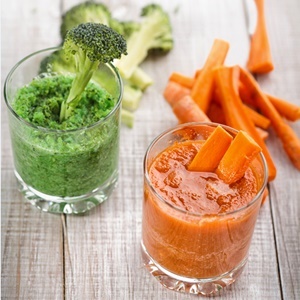
We all familiar with the variety of “detox” diets available in the press and on the market.
They vary from drinking water, fruit and vegetable juices and herbal teas, to only eating a selection of fruit and vegetables.
The first few days may be difficult, but as soon as "lightness" sets in and our energy levels improve, we believe we're really detoxing.
The problem is, because these detox regimes don't support a healthy lifestyle, within a week or two we abandon the detox diet and return to our familiar ways.
Read: Juice diets: do they work?
What does medical science say about detoxification?
Detoxification is a continuous process that the body performs naturally.
Seventy five percent of the deactivation of toxins takes place in the liver and the remainder in the intestine.
As soon as potentially harmful substances enter the body, the body's detoxification systems – which consist of a series of metabolic reactions – start doing their job.
Read: Detox diets: do they really work?
What are toxins?
Toxins enter our body through processed foods (sugar and white flour products), medication, smoking, alcohol, and caffeine as well as via environmental toxins such as heavy metals and pesticides.
Or, your body may generate them. These are the end products of metabolism, hormones (stress) or bacterial by-products.
Detoxification takes place in 3 phases:
1. Identification (modification): Certain enzymes support the reactions that identify harmful substances through oxidative processes and create unstable toxic substances.
2. Neutralization (conversion): These substances need to be bounded by conjugators to make them harmless and soluble for excretion.
3. Elimination (elimination): The end products are excreted by our skin, lungs, kidneys and the digestive tract.
Stress hormones, medication and tobacco all compete for phase 1 enzymes. Without the supplementation of nutrients from a wide variety of foods, the liver becomes overwhelmed, leading to inflammation and disease.
What should we eat to detox?
We need the full complement of nutrients such as vitamins, minerals and phytonutrients (carotenoids, flavonoids, terpenes, indoles, isothiocynates) that support the enzymes and metabolic processes involved in phase 1 to 3 to function optimally.
We find them in the following foods:
Vegetables: Allium family – onions, garlic, chives, leeks
Brassica: Broccoli, Brussels sprouts, bok choy, cabbage, cauliflower, kale, mustard greens, radishes, horseradish, turnips, watercress, wasabi
Other: Beets, celery, cucumber, spinach
Fruit: Avocado, cranberries, blueberries, apples, pears, grapefruit, lemons, oranges, citrus peel
Legumes: Lentils, beans dry peas, chickpeas
Fats: Olive oil, canola oil, almonds, Brazil nuts, hazelnuts, pistachios
Herbs and spices: Rosemary, cumin, turmeric, caraway and dill seeds and oil
Seafood: Wild caught salmon, sardines
Animal protein: Organic chicken, turkey, wild game
Key points to remember
- Consume a wide variety of fresh vegetables and fruit daily.
- Select foods which are whole and unprocessed without synthetic production. For example, snack on a fresh fruit instead of a protein bar; enjoy a freshly made vegetable soup instead of an instant Cup-a-Soup.
- Consume a minimum of six glasses of water per day.
- Ensure optimal gut function by consuming high-fibre foods such as whole grains (barley, quinoa, corn, rolled oats and wild/brown rice).
- Move on a regular basis – enough to build up a sweat.
Conclusion
A vegetable juice can absolutely be enjoyed as part of a daily healthy eating plan as it's an ideal way to boost your intake of 5 to 9 portions of fresh vegetables and fruit.
If you're unsure about how to create a healthy eating plan, consult a registered dietitian or post a question to The Dietitians.
Read more:
Detox diets – healthy or harmful?
References
Lyon M et al Clinical approaches to detoxification and biotransformation. Institute for Functional medicine, Gig Harbor, Washington 2006
Mahan KL, Escott-Stump S, Raymond JL. Krause’s Food & Nutrition care Process, 13 edition. Philadelphia, Saunders. 2012.




 Publications
Publications
 Partners
Partners










